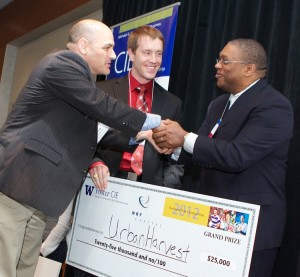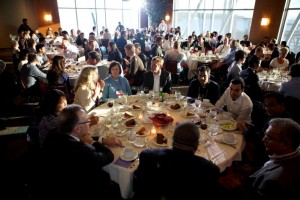Standing room only: celebrating “entrepreneurial speed”
 Outside the sun set gloriously over Elliott Bay and the Olympic Mountains. Inside, even the sky couldn’t distract the entrepreneurs, student teams, judges, press and guests in Seattle’s Pier 66 ballroom from the excitement of the main event—the 15th annual University of Washington Business Plan Competition (BPC) awards. Having no idea how the finalists had placed for the $68,000 in prizes, the crowd listened with rapt attention to each team’s one-minute pitch.
Outside the sun set gloriously over Elliott Bay and the Olympic Mountains. Inside, even the sky couldn’t distract the entrepreneurs, student teams, judges, press and guests in Seattle’s Pier 66 ballroom from the excitement of the main event—the 15th annual University of Washington Business Plan Competition (BPC) awards. Having no idea how the finalists had placed for the $68,000 in prizes, the crowd listened with rapt attention to each team’s one-minute pitch.
The diversity of the four finalist start-ups made it difficult for audience members to venture a guess who would take grand prize. Would it be Xylemed or Joey Bra? Bicycle Billboards or Urban Harvest? As each student ended his or her team pitch minute, you could almost hear guests thinking, “Fantastic idea!”
What Zulily CEO Darrell Cavens then shared during his keynote speech was how to get such fantastic ideas to market by leveraging what he calls “Zulily time.” Called “an entrepreneurial speed freak if there ever was one” by Geekwire, Cavens emphasized not only the importance of “going fast” but of using the Internet as a tool to tweak the offering, making it better each day along the way. “Don’t spend five months on your business plan—apologies to the professors in the room! Put that plan together, and try it, innovate on it, adjust it, move forward.” Now launching 1,400 new styles of kid products a day, Zulily focuses on beating rivals to the punch while delivering exceptional customer service. “It’s what we do every single day,” Cavens explained.
The BPC prize winners are now putting that sentiment into practice.
The $25,000 WRF Capital Grand Prize winner, Urban Harvest, will soon convert one of Microsoft’s Redmond parking garage rooftops into an active garden, allowing them to “grow their own” lettuce and herbs rather than continue to truck their food service salad fixings from the Salinas Valley. The team of two Foster School of Business MBAs, Chris Sheppard (MBA/JD) and Chris Bajuk (MBA/MS real estate), intend to put many more commercial rooftops to better use as hydroponic gardens that serve building owners as well as the local community. In addition to delivering the benefits of local agriculture, the Urban Harvest co-founders, both former military, have made hiring fellow veterans a priority.
Xylemed, the winner of the $10,000 Jones Foundation second-place prize, provides cloud-based electronic patient tracking and operations management system for hospitals. Their goal is to eliminate patient care white boards used in surgery departments and replace them with 60-inch screens that can be updated with current information from any hospital computer. Ben Andersen and Marc Brown led the team of Foster School Technology Management MBAs that designed the system. Xylemed’s product is already used in several of Seattle’s top hospitals—including Harborview Medical Center and the UW Medical Center—to improve safety and communications while reducing costs and administrative headaches.
 After gaining incredible national press coverage with their initial product launch, Joey Bra’s fashion- forward bra with a discreet cell-phone pocket garnered the team one of the BPC’s $5,000 finalist prizes. Marketed initially to female college students who need a place to stow their phone and keys while out on the town, the two Foster School undergraduate co-founders, Kyle Bartlow and Mariah Gentry, are now working quickly to introduce a sports bra version to market.
After gaining incredible national press coverage with their initial product launch, Joey Bra’s fashion- forward bra with a discreet cell-phone pocket garnered the team one of the BPC’s $5,000 finalist prizes. Marketed initially to female college students who need a place to stow their phone and keys while out on the town, the two Foster School undergraduate co-founders, Kyle Bartlow and Mariah Gentry, are now working quickly to introduce a sports bra version to market.
Finally, Biking Billboards, which brings mobile marketing focused on building strong, personal customer connections, won the second $5,000 finalist prize. The company, whose founding team includes Foster undergraduates Curtis Howell and Claire Koerner as well as two non-students, is now expanding to Los Angeles. As existing clients T-Mobile and PEMCO can attest, Biking Billboard “brand ambassadors” are able to more authentically engage with micro-targeted consumers on specialized routes.
